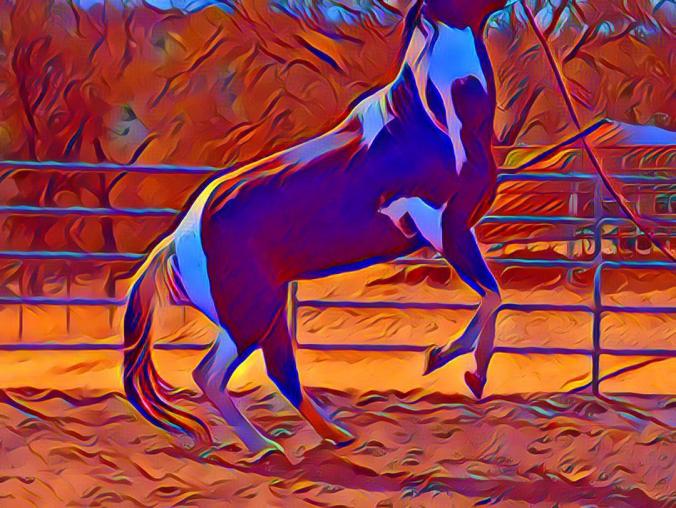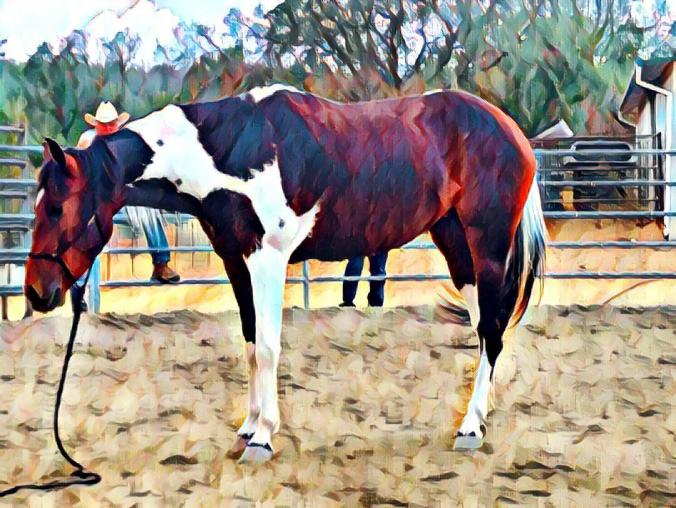This is probably going to be a disjointed piece. I started it for one reason, and set it aside, and then it popped back into my head for an entirely different reason, which now seems like what I was waiting for to get to the point I wasn’t sure I had.
“Instead of trying to help the horse handle more they get more careful. And the more careful they get,the more careful they have to be. And pretty soon the horse has trained them to do nothing.” –Harry Whitney

I heard this quote at a horsemanship clinic, and it sounded uncomfortably familiar. I have a horse like this, one who who has trained me to do nothing to the point that I had stopped even approaching him except to feed. He seems to be very fond of people, me included, as long as we just hang around and don’t ask anything – at all – of him. It’s human requests for work that are the problem.
Based on his past it’s a reasonable problem that he has with the requests; I can’t argue with his logic. He was clearly asked to do far too much far too young. I have always said his dressage career was like asking a third grader who shows promise in math by learning the multiplication tables easily to do calculus, and then declaring him a failure when he couldn’t understand it.
Before that he was given good basics from someone who was a wonderful and gentle horseman right up until a horse flatly refused to do something, and then the beatings began. Just till the point that the horse decided to comply, and then it was all peace and gentleness again. I imagine this is confusing to a horse.
It’s particularly easy for me with a horse with this background, who is also very large, who is also very reactive, to back off and back off and back off till the point I am not even there. The whole idea of making myself noticeable enough for the horse to start to care what I might be asking is something I had stopped considering.

Backing off to the point of doing nothing is a behavior I learned well from humans pretty early in my life. It’s one of those behaviors that served me in the past, and though it doesn’t actually serve me in the present I’ve gotten so adept at it I sometimes don’t even know I’m doing it. I became aware of it as a bad relationship pattern in my adult life and so I first thought it was a something I started as an adult. But then I had a conversation with my high school boyfriend, now a good friend, who told me he had been talking to his therapist about me before I came for a visit and he had said “She was the perfect woman for me because she didn’t ask anything of me.” Talk about a good opening line for me to take to my own therapist.
As a child I learned young that it was best to slide through my days without asking for anything. The less I needed or asked for, the safer it was to walk through my house. This is not a crazy thing to extrapolate later to a large and reactive animal who could actually hurt me without even trying to. It may, however, be a little crazy that at some point in my life I became proud of being so undemanding, proud that I don’t ask anything of anyone.
Not wanting to get big enough to get my horse’s attention is more complicated than “I want him to like me.” It’s also that I don’t want to upset him to the point I get hurt. It’s also that I don’t want to be the person he feels like he has to tiptoe around, because I know what that feels like. I don’t want to be the crazy person that makes everyone else afraid.
Not wanting to be demanding enough in my human relationships to get attention – well, I’m not sure if that’s a different story or not. It does have something to do with “I want them to like me,” but also with believing that my worth to someone else is defined by what I can (and will) do for them, and not by who I am. It also has to do with “I don’t want to upset him to the point that I get hurt.”
And this brings us to yesterday, when I started thinking again about what I wrote above and then tabled for several months. When I started seeing the “me too” hashtag on social media around stories of sexual harrassment, I had very mixed feelings. My first thought was that I didn’t really have any stories like that, but when I thought about it a bit more I realized that my stories are just so commonplace I don’t even think about them as harrassment. A male friend asked his friends on social media what he could read to better understand. I suggested he ask women he knows for their stories, and then I told him mine.
What I wrote to him began: “At first my “me too” was just (“just!”) about random occasional catcalls and yelled comments from construction workers or whoever, “it’s a joke” statements by people known and unknown, moments of fear on city streets, in dark parking lots, on the subway.”
The more I wrote, the more I remembered specific incidents, some with people I knew and respected and trusted, and the more horrified I became at what I have come to think of as normal. As I also wrote to this friend: “I don’t consider that anything bad has ever happened to me. I had to think long and hard about whether I had a “me too” because it’s just how things are for women. I feel like I have never not known how to walk with a purpose, how to deliberately make myself not look like a potential victim. It’s impossible to learn those skills without knowing you are doing so because you ARE a potential victim, because you can in fact be overpowered far too easily.”
The most recent articles and conversations I have read on this topic have been about one highly publicized incident that has engendered a lot of comments like “Why didn’t she leave?” and “How could he be expected to read her mind?” I think my fascination with this particular conversation has been that I can see both sides so easily, and I don’t see a clear right and wrong. I think about how I have learned to do nothing, to not react, in situations where I feel afraid, and how the more afraid I feel the less I do, in an effort not to trigger a response I don’t think I can handle.
I have a lot of places where I know that my horsemanship and the rest of my behavior in life are inexctricable from one another. As I contemplate how to work with my horses in order to get to where I want to be – knowing what I am asking for, asking for it clearly, and shaping the response I get into something that the two of us are doing together with both of us fully present – I realize how much of this work is mine alone to do.
